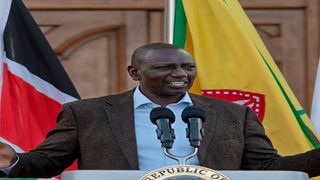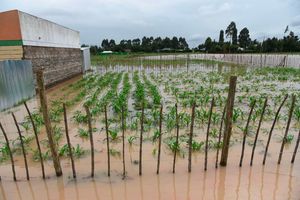Developing story: Iranian President Ebrahim Raisi confirmed dead in chopper crash

President William Ruto.
Our Columnists
Premium
Kenya must jettison populism and return to rational policy processes
Undeniably, as President William Ruto delivered his first State of the Nation address on November 9, over 14 months since ascending to power on September 13, 2022, Kenya is in a profound state of national crisis — its worst since independence.
Notably, the architects of Kenya’s 2010 Constitution conceived the State of the Nation Address by a sitting President as an instrument of national security — a reality check against the possible return of a strongman rule to trample upon national values and principles of governance, wreaking havoc on the economy and foreign relations.
However, mired in the twin-ideological crisis of populism and post-truth politics, Kenya’s new power elite is ill-disposed to effectively address the country’s complex crisis.
Populism — a political approach that strives to appeal to ordinary people who feel that their concerns are disregarded by established elite groups — has split Kenya’s populations into rich and poor, shareholders and non-shareholders.
Further, post-truth politics — a malign culture of politics in which leaders treat facts as irrelevant and, therefore, turn lies, misinformation, propaganda into a currency of trade — has fuelled policy inconsistencies, misinformation, lies and false promises. The jury is still out as to whether the 2023 State of the Nation Address calmed a restless people or kindled their hope for a bright future.
The State of the Nation Address by a sitting President was ingrained into the 2010 Constitution as a protective measure against the Kenyan nation slipping back into one-party dictatorship, or into a personalised despotism under a strongman. In the past, the yoke of tyranny led to corruption, underdevelopment, mass poverty and the threat of chaos, anarchy and national disintegration.
In this context, Article 132 relating to the State of the Nation as speech one of the functions of the President is perfectly about national security. As a summation of all the measures taken and the progress achieved in the realisation of Kenya’s national values, the State of the Nation Address is, undoubtedly, the best guarantee that a government of the people by the people and for the people shall not perish from the land, and that Kenya will continue to fulfil its international obligations. In this regard, the State of the Nation speech is not a polemical or rhetorical statement, but a rational process to help Kenya chart its future.
An effective State of the Nation Statement must answer five interlinked questions that shed light on the destiny of the country.
First, what is the state of our democracy in regard to patriotism, national unity, sharing and devolution of power, the rule of law, and participation of the people? Second, what is the state of the “rights bearing” citizens in Kenya, a country sworn to uphold human dignity, equity, social justice, inclusiveness, equality, human rights, non-discrimination and protection of the marginalised?
Third, what is the state of the government in regard to the values of good governance, integrity, transparency and accountability? Fourthly, what is the state of sustainable development to ensure shared prosperity, equality and poverty eradication? Finally, what is the state of Kenya’s foreign policy in regard to the progress made in fulfilling its international obligations?
The law requires that the government be crystal clear about what it has done or plans to do to advance these five core indicators of the ‘national values and principles of governance’ as laid out in Article 10 of the Constitution.
Two ideological trends, however, continue to undermine the state of the Kenyan nation in regard to its democracy, the economy, politics and foreign policy. One Kenya’s new dalliance with populism, eroding national cohesion, democratic stability and the economy.
Over the last five years, Kenya has witnessed a strident rise and triumph of Africa’s most effective populist movement. Populism, identified with Donald Trump and the British exit from the European Union (Brexit), is just another term for charlatanism and demagoguery.
Over 14 months since election, the country’s power elite has been unable to tone down the fiery populist rhetoric of the campaign era, exit the campaign trenches and settle down to work to halt the slide of the economy into recession.
Long after the 2022 elections, populist politics continue to polarise the country along class lines pitting the rich against the poor, ‘shareholders’ and ‘non-shareholders’. Paradoxically, populism merely replaces the former elite with a new elite that has direct allegiance to the leader.
The economic liberalism of the Kibaki and Jubilee era has been quickly displaced by ‘economic populism’, which has little or no regard for experts or meritocracy. A clear robin-hood logic is driving draconian taxation policies, robin-hooding money from the rich to pay for the ‘common people’.
Populists everywhere have an external scapegoat. For Adolf Hitler, it was the Jews. For Idi Amin, it was the Asians. In America, it is the Chinese and immigrants. In Kenya, debt, especially owed to the Chinese, is the scapegoats for the country’s economic woes.
The second ideological strand is the post-truth politics. Sections of Kenya’s power elite are mired in post-truth politics — a malign political culture in which leaders treat facts as irrelevant and, therefore, turn lies, misinformation, propaganda as their currency of trade. This has led to widespread policy inconsistencies, pure misinformation, lies and false promises, which has poisoned Kenyan economic discourse.
The tide appears to be turning. On November 8, Kenya Kwanza parliamentarians called for the return of fuel subsidy to lower the cost of living. There are calls on the ruling elite to stop the blame game.
It is possible for Kenya to rise, like the Sphynx from the ashes of its worst economic crisis over the last six decades: extra-ordinary rise in the tax burden, a shilling on a free-fall, ever-rising cost of living, spiraling prices of food and fuel, collapsed or unaffordable welfare services, shrinking middle class and the stagnation of almost all sectors of an economy, which is slowly slipping into a recession. But Kenya must jettison populism and post-truth politics and return to rational policy processes.
- Prof Peter Kagwanja former Government Adviser (2007-2013), and currently CEO at the Africa Institute and Adjunct Professor at the University of Nairobi and National Defence University.





